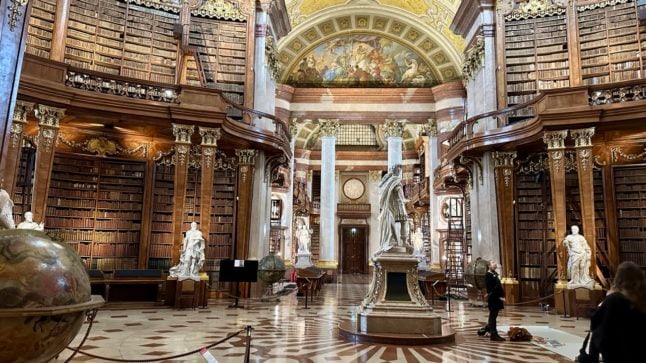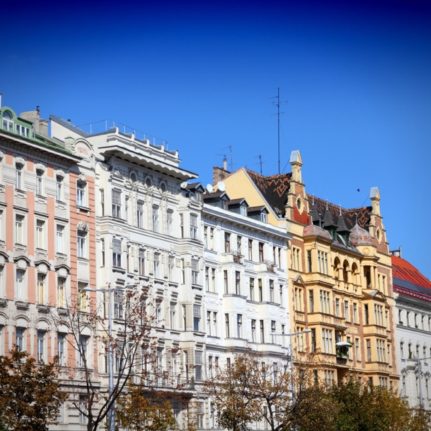Join a language meetup
In Vienna, it is possible to join a language meetup group while visiting a language café or by using various online platforms and language exchange apps to find a suitable group. One coffee place that regularly offers language exchanges is Sprachencafe bei Station Wien, located in the fifth district, Margareten.
If you prefer finding your group online, many platforms help connect language learners and native speakers based on shared interests, ensuring that participants can find meetups adapted to their preferences.
Meetup is one of the most common platforms for language exchanges, and it has various language groups in Vienna where you can find like-minded people. The platform offers events that can be attended in person and online. Another option is to use InterNations, a global community and network that connects expats and global minds living in different cities worldwide. They have a local language exchange group in Vienna that welcomes new members.
READ ALSO: ‘You need German’: What you wish you’d known before moving to Austria
Furthermore, social media offers different language meetups and exchange groups that are easy to join. One of them is the Language Exchange Club Vienna on Facebook, where private people organise and post other events related to improving language skills.
Find a tandem partner
A great way to develop your language skills is to find a specific person to talk to within the language you want to improve. In exchange, you can teach the other person a language that you are fluent in.
Tandem language exchange is something you can do both online and offline. There are apps available if you prefer an online service, such as the app ‘Tandem.’ Another way to find your language partner is through social media groups. ‘Vienna Tandem Sprachencafe Language Exchange‘ is a group available on Facebook that allows you to search for or post requests to find a relevant tandem partner. Furthermore, different institutions in Vienna also serve as connecting points for tandem exchanges.
The University of Vienna offers a platform for language exchange called ‘Sprachlernbörse,’ where you can find a suitable language partner.
Go to cultural events and workshops
Every year, Vienna hosts a great number of cultural events, activities, and festivals. Participating in these events not only exposes you to the language but also improves your understanding of Austrian culture. Some of the most popular yearly events are the Vienna Film Festival (Viennale), Vienna Festival Weeks (Wiener Festwochen), the Christmas markets, Donauinselfest, and Vienna Design Week.
At Viennale, the annual film festival held every October, you can attend screenings and discussions. This is a great way to expose yourself to German-language films and discussions in German. During the same month, Vienna Design Week takes place. The design festival celebrates contemporary design and offers opportunities to explore the intersection of design and language through a wide range of workshops, exhibitions, and discussions, all in German.

The Christmas markets are great places for language improvement during the winter. You can easily engage with vendors in different markets while practising your German, participating in cultural activities, and enjoying seasonal treats.
READ ALSO: What are the best Christmas markets in Austria according to the locals?
Summers in Vienna allow for many opportunities to engage in activities where it is possible to improve your German. Every summer, Vienna Festival Weeks (May to June) take place all over the city, offering varied music, theatre, dance, and visual art programs. Engaging with the festival allows you to experience the German language in various artistic forms.
At the end of June, Donauinselfest offers another great occasion to come closer to the German language. It is Europe’s largest open-air festival, and it goes on for three days. The festival offers a lively atmosphere for language practice with German speakers from multiple locations.
READ ALSO: How to enjoy summer like a true Austrian
In addition, many cultural institutions in Vienna constantly organise workshops, talks, and discussions where everyone is welcome. Participating in these events not only improves your understanding of Austrian culture but also makes it possible for you to engage in conversations with native speakers on various topics.
MuseumsQuartier (MQ) is one of the largest cultural complexes in the world for contemporary art and culture. It holds 60 cultural institutions, including various museums, galleries, and cultural spaces. It regularly hosts workshops, discussions, and talks about design, contemporary art and cultural issues. The House of Music (Haus der Musik) is an interactive museum devoted to sound and music. It hosts events, including workshops and talks about music history, technology, and innovation. The Austrian National Library, one of the world’s largest libraries in the world, organises different cultural events, involving lectures and discussions on literature, history, and philosophy.
Use free vouchers to learn German
Vienna offers a range of free services for immigrants, supporting their German language studies through various means, including the provision of Vienna Language Vouchers. These vouchers, valued at €150 or €300, can be used by immigrants to subsidise their German classes offered by city-approved course providers. Some of the approved German course providers are available here. The vouchers are valid for A1, A2, and B1 courses. To be eligible for the voucher, your primary residence needs to be in Vienna, and you cannot have been in Vienna for longer than two years.
The vouchers are part of the benefits given to people participating in Vienna’s “Start” coaching program, which offers individual counselling for new immigrants. You can obtain them by scheduling an appointment with a city representative, reachable at +431905003604 (they speak English and several other languages).
READ ALSO: EXPLAINED: How to get free vouchers to learn German in Vienna
Visit a language course
Vienna offers a wide range of high-quality language institutes where you can learn German. Some of the most popular ones are DeutschAkademie, Dialog, and the Sprachenzentrum at the University of Vienna. These three institutes provide various types of courses, including intensive courses, examination preparation courses, and specialised courses tailored to specific individual needs, such as requests for private tutoring or courses focusing on grammar.
READ ALSO: A1 to C2: What are the different levels in German and how do I reach them?
Enrolling in the institutes as either a complete beginner or a fluent speaker looking to refine specific details is possible. Most language schools in Vienna generally offer courses at various levels aligned with the Common European Framework of Reference for Languages (CEFR). This ensures that you can find a class that matches your current language skills and helps you progress to higher levels.



 Please whitelist us to continue reading.
Please whitelist us to continue reading.
Member comments